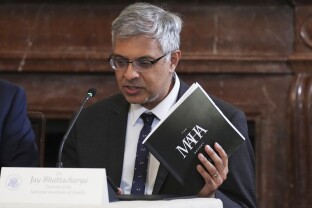Republican Sen. Susan Collins lambasted National Institutes of Health Director Jay Bhattacharya at a hearing Tuesday morning over the Trump administration’s proposed cuts to the agency’s funding.
“I am well aware that you have devoted your life to medical research, to health economics, and that you care very deeply about NIH,” said Collins, who chairs the Appropriations Committee, where Bhattacharya was appearing. “That is why the administration’s reduction of more than $19 billion to the agency’s budget — approximately 40% — is so disturbing.”
Along with cutting the agency’s budget from $47 billion to $27 billion, the budget proposal would also consolidate the number of divisions within the NIH from 28 to 15, terminate thousands of contracts and end certain federal and social health care programs.
Collins added that she felt the proposed cuts would put the U.S. at risk of falling behind China and other countries. She also questioned the 15% cap on indirect costs funding the NIH put in place earlier this year.
“This proposed cap is so poorly conceived,” said Collins. “I have seen firsthand how harmful it is.”
It was a sharp rebuke from Collins, who was a reluctant vote for Health Secretary Robert F. Kennedy Jr. And she was not alone among the Republican members of the Appropriations Committee who criticized the administration’s funding priorities. Sen. Jerry Moran said that Congress may allocate more funding for the NIH on top of what the administration’s budget proposes, asking Bhattacharya how he would distribute those funds.
“I encourage Congress to exert its authorities, utilize its responsibilities in this arena and many others,” Moran said.
Sen. John Kennedy brushed off the concerns of his colleagues while acknowledging that the budget will likely change, asking rhetorically, “When’s the last time Congress enacted a president’s budget? It’s never happened in the history of ever.”
Democrats also castigated Bhattacharya. Sen. Tammy Baldwin questioned Bhattacharya on the NIH’s proposal to change how it funds some research grants — allocating the funds over several years, rather than all at once, a practice known as forward funding. Baldwin said that the plan will result in even more funding cuts in the future.
“Dr. Bhattacharya, I’m struggling to find a reason why NIH would implement this forward funding policy,” Baldwin said. “How is this proposal anything but intentionally sabotaging vital medical research?”
Bhattacharya responded that in the long run, the policy would allow the NIH to “spend more money and have more flexibility for research projects.”
“That’s funny math,” Baldwin replied.
At times, Bhattacharya seemed to equivocate on whether he even supported some of the proposed cuts.
“The transition has been a very bumpy time,” Bhattacharya told Democratic Sen. Dick Durbin when questioned about proposed cuts to Alzheimer’s research.
The NIH is the largest single funder of biomedical research in the world, and has long enjoyed bipartisan support. But cuts across the Department of Health and Human Services, led by Kennedy and DOGE, have already reduced its personnel by thousands and halted clinical trials and ongoing research.
The administration’s funding proposal has met significant pushback from scientists in and out of the government. A letter signed by hundreds of current and former NIH employees published Monday urges Bhattacharya to restore cut grants and alter the proposed budget to include more funding.
“The life-and-death nature of our work demands that changes be thoughtful and vetted,” the letter states.
Some Republican senators praised Bhattacharya and the proposed budget, saying the changes were necessary to streamline the agency.
“Thank you for being innovative in how we approach this and working with our colleagues on this committee to modernize the outdated system that rewards legacy and not actual results,” said Sen. Katie Britt.
—
Margaret Manto is a NOTUS reporter and an Allbritton Journalism Institute fellow.
Sign in
Log into your free account with your email. Don’t have one?
Check your email for a one-time code.
We sent a 4-digit code to . Enter the pin to confirm your account.
New code will be available in 1:00
Let’s try this again.
We encountered an error with the passcode sent to . Please reenter your email.


